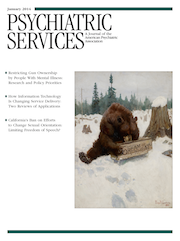Enhanced Fidelity to Treatment for Bipolar Disorder: Results From a Randomized Controlled Implementation Trial
Abstract
Objective
The authors compared fidelity to bipolar disorder treatment at community practices that received a standard or enhanced version of a novel implementation intervention called Replicating Effective Programs (REP).
Methods
Five community practices in Michigan and Colorado were assigned at random to receive enhanced (N=3) or standard (N=2) REP to help implement Life Goals Collaborative Care (LGCC), a psychosocial intervention consisting of four self-management support group sessions, ongoing care management contacts by phone, and dissemination of guidelines to providers. Standard REP includes an intervention package consisting of an outline, a treatment manual and implementation guide, a standard training program, and as-needed technical assistance. Enhanced REP added customization of the treatment manual and ongoing, proactive technical assistance from internal and external facilitators. Multiple and logistic regression analyses determined the impact of enhanced versus standard REP on patient-level fidelity.
Results
The participants (N=384) had a mean age of 42 years; 67% were women, and 30% were nonwhite. Participants attended an average of three group sessions and had an average of four care management contacts. After adjustment for patient factors, enhanced REP was associated with 2.6 (p<.001) times more total sessions and contacts than standard REP, which was driven by 2.5 (p<.01) times more care management contacts. Women and participants with a history of homelessness had fewer total sessions and contacts.
Conclusions
Enhanced REP was associated with improved LGCC fidelity, primarily for care management contacts. Additional customization of interventions such as LGCC may be needed to ensure adequate treatment fidelity for vulnerable populations.



